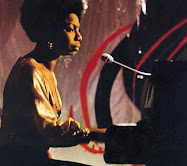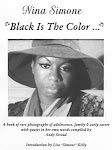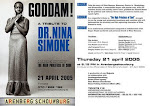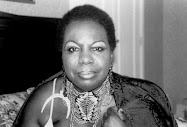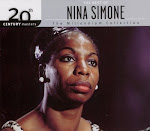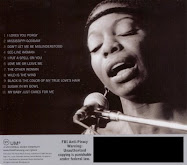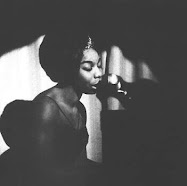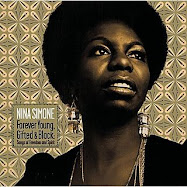Sunday, December 25, 2011
Jazz For Christmas
Ramsey Lewis Trio - Merry Christmas Baby (1961)
John Coltrane - What Child Is This? (Greensleeves) Live @ Village Vanguard (1961)
Oscar Peterson plays Jingle Bells
Bill Evans / Santa Claus Is Coming To Town
Charlie Parker-White Christmas
Louis Armstrong / Christmas in New Orleans & Billie Holiday / I've Got My Love To Keep Me Warm
Miles Davis - blue xmas
Wynton Christmas
Silent Night - Kathleen Battle, Wynton Marsalis
The Christmas Song - Dexter Gordon Quartet
Kenny Burrell - Have Yourself A Merry Christmas.WMV
Jimmy Smith God Rest Ye Merry, Gentlemen
Dave Koz & Friends - Smooth Jazz Christmas Overture
Ramsey Lewis Trio - God Rest Ye Merry, Gentlemen (1961)
Oscar Peterson plays O Christmas Tree
Thursday, December 22, 2011
Wednesday, October 26, 2011
John Coltrane Tribute to the greatest Tenor saxophonist of all time, John William Coltrane (Trane)
Merely mention the name John Coltrane and you’re likely to evoke a deeply emotional, often spiritual response from even the most casual jazz fan. John Coltrane was the most revolutionary and widely imitated saxophonist in jazz.
 Born September 23, 1926 in Hamlet, North Carolina, John Coltrane was always surrounded by music.Coltrane grew up in High Point, North Carolina, his father played several instruments sparking Coltrane’s study of E-flat horn and clarinet. While in high school, (at about the age of 15) Coltrane’s musical influences shifted to the likes of Lester Young and Johnny Hodges prompting him to switch to alto saxophone. After moving to Philadelphia, he continued his musical training at Granoff Studios and the Ornstein School of Music. He was called to military service during WWII, where he performed in the U.S. Navy Band (1945-46) .
Born September 23, 1926 in Hamlet, North Carolina, John Coltrane was always surrounded by music.Coltrane grew up in High Point, North Carolina, his father played several instruments sparking Coltrane’s study of E-flat horn and clarinet. While in high school, (at about the age of 15) Coltrane’s musical influences shifted to the likes of Lester Young and Johnny Hodges prompting him to switch to alto saxophone. After moving to Philadelphia, he continued his musical training at Granoff Studios and the Ornstein School of Music. He was called to military service during WWII, where he performed in the U.S. Navy Band (1945-46) . After the war,he played alto saxophone in the bands led by Joe Webb and King Kolax, then changed to the tenor to work with Eddie "Cleanhead" Vinson (1947-48). He performed on either instrument as circumstances demanded while in groups led by Jimmy Heath, Howard McGhee, Dizzy Gillespie (with whom he made his first recording in 1949), Earl Bostic, and lesser-known rhythm-and-blues musicians, but by the time of his membership in Johnny Hodges's septet (1953-54) he was firmly committed to the tenor instrument. Coltrane began playing tenor saxophone with the Eddie "CleanHead" Vinson Band, and was later quoted as saying, "A wider area of listening opened up for me. There were many things that people like Hawk, and Ben and Tab Smith were doing in the ‘40’s that I didn’t understand, but that I felt emotionally." Prior to joining the Dizzy Gillespie band, Coltrane performed with Jimmy Heath where his passion for experimentation began to take shape. However, it was his work with the Miles Davis Quintet with Red Garland, Paul Chambers, and Philly Joe Jones (1955-57) that would lead to his own musical evolution. " Miles music gave me plenty of freedom," he once said. During that period, he became known for using the three-on-one chord approach, and what has been called the ‘sheets of sound,’ a method of playing multiple notes at one time.
After the war,he played alto saxophone in the bands led by Joe Webb and King Kolax, then changed to the tenor to work with Eddie "Cleanhead" Vinson (1947-48). He performed on either instrument as circumstances demanded while in groups led by Jimmy Heath, Howard McGhee, Dizzy Gillespie (with whom he made his first recording in 1949), Earl Bostic, and lesser-known rhythm-and-blues musicians, but by the time of his membership in Johnny Hodges's septet (1953-54) he was firmly committed to the tenor instrument. Coltrane began playing tenor saxophone with the Eddie "CleanHead" Vinson Band, and was later quoted as saying, "A wider area of listening opened up for me. There were many things that people like Hawk, and Ben and Tab Smith were doing in the ‘40’s that I didn’t understand, but that I felt emotionally." Prior to joining the Dizzy Gillespie band, Coltrane performed with Jimmy Heath where his passion for experimentation began to take shape. However, it was his work with the Miles Davis Quintet with Red Garland, Paul Chambers, and Philly Joe Jones (1955-57) that would lead to his own musical evolution. " Miles music gave me plenty of freedom," he once said. During that period, he became known for using the three-on-one chord approach, and what has been called the ‘sheets of sound,’ a method of playing multiple notes at one time. Coltrane next played in Thelonious Monk's quartet (July-December 1957), but owing to contractual conflicts took part in only one early recording session of this legendary group. He rejoined Davis and worked in various quintets and sextets with Cannonball Adderley, Bill Evans, Chambers, Jones, and others (1958-60). While with Davis he discovered the soprano saxophone, purchasing his own instrument in February 1960.
Coltrane next played in Thelonious Monk's quartet (July-December 1957), but owing to contractual conflicts took part in only one early recording session of this legendary group. He rejoined Davis and worked in various quintets and sextets with Cannonball Adderley, Bill Evans, Chambers, Jones, and others (1958-60). While with Davis he discovered the soprano saxophone, purchasing his own instrument in February 1960. Throughout the 1950s addiction to drugs and then alcoholism disrupted his career. Shortly after leaving Davis, however, he overcame these problems.

 Having led numerous studio sessions, established a reputation as a composer, and emerged as the leading tenor saxophonist in jazz, Coltrane was now prepared to form his own group; it made its debut at New York's Jazz Gallery in early May 1960. After briefly trying Steve Kuhn, Pete La Roca, and Billy Higgins, Coltrane hired two musicians who became longstanding members of his quartet, McCoy Tyner (1960-65) and Elvin Jones (1960-66); the third, Jimmy Garrison, joined in 1961. With these sidemen the quartet soon acquired an international following. At times Art Davis added a second double bass to the group; Eric Dolphy also served as an intermittent fifth member on bass clarinet, alto saxophone, and flute from 1961 to 1963,eventually adding players like Pharoah Sanders. The John Coltrane Quartet created some of the most innovative and expressive music in Jazz history including the hit albums: "My Favorite Things," "Africa Brass," " Impressions," " Giant Steps," and his monumental work "A Love Supreme" which attests to the power, glory, love, and greatness of God. Coltrane felt we must all make a conscious effort to effect positive change in the world, and that his music was an instrument to create positive thought patterns in the minds of people.
Having led numerous studio sessions, established a reputation as a composer, and emerged as the leading tenor saxophonist in jazz, Coltrane was now prepared to form his own group; it made its debut at New York's Jazz Gallery in early May 1960. After briefly trying Steve Kuhn, Pete La Roca, and Billy Higgins, Coltrane hired two musicians who became longstanding members of his quartet, McCoy Tyner (1960-65) and Elvin Jones (1960-66); the third, Jimmy Garrison, joined in 1961. With these sidemen the quartet soon acquired an international following. At times Art Davis added a second double bass to the group; Eric Dolphy also served as an intermittent fifth member on bass clarinet, alto saxophone, and flute from 1961 to 1963,eventually adding players like Pharoah Sanders. The John Coltrane Quartet created some of the most innovative and expressive music in Jazz history including the hit albums: "My Favorite Things," "Africa Brass," " Impressions," " Giant Steps," and his monumental work "A Love Supreme" which attests to the power, glory, love, and greatness of God. Coltrane felt we must all make a conscious effort to effect positive change in the world, and that his music was an instrument to create positive thought patterns in the minds of people.Coltrane turned to increasingly radical musical styles in the mid-1960s. These controversial experiments attracted large audiences, and by 1965 he was surprisingly affluent. From autumn 1965 his search for new sounds resulted in frequent changes of personnel in his group. New members included Pharoah Sanders, Alice Coltrane (his wife), Rashied Ali (a second drummer until Jones' departure), several drummers as seconds to Ali, and a number of African-influenced percussionists. In his final years and after his death, Coltrane acquired an almost saintly reputation among listeners and fellow musicians for his energetic and selfless support of young avant-garde performers, his passionate religious convictions, his peaceful demeanor, and his obsessive striving for a musical ideal.
 In 1967, liver disease took Coltrane’s life leaving many to wonder what might have been. Yet decades after his departure his music can be heard in motion pictures, on television and radio. Recent film projects that have made references to Coltrane’s artistry in dialogue or musical compositions include, "Mr. Holland’s Opus", "The General’s Daughter", "Malcolm X", "Mo Better Blues", "Jerry McGuire", "White Night", "The Last Graduation", "Come Unto Thee", "Eyes On The Prize II" and "Four Little Girls". Also, popular television series such as "NYPD Blue", "The Cosby Show", "Day’s Of Our Lives", "Crime Stories" and "ER", have also relied on the beautiful melodies of this distinguished saxophonist.
In 1967, liver disease took Coltrane’s life leaving many to wonder what might have been. Yet decades after his departure his music can be heard in motion pictures, on television and radio. Recent film projects that have made references to Coltrane’s artistry in dialogue or musical compositions include, "Mr. Holland’s Opus", "The General’s Daughter", "Malcolm X", "Mo Better Blues", "Jerry McGuire", "White Night", "The Last Graduation", "Come Unto Thee", "Eyes On The Prize II" and "Four Little Girls". Also, popular television series such as "NYPD Blue", "The Cosby Show", "Day’s Of Our Lives", "Crime Stories" and "ER", have also relied on the beautiful melodies of this distinguished saxophonist. In 1972, "A Love Supreme" was certified gold by the RIAA for exceeding 500,000 units in Japan. This jazz classic and the classic album "My Favorite Things" were certified gold in the United States in 2001.In 1982, the RIAA posthumously awarded John Coltrane a Grammy Award of " Best Jazz Solo Performance" for the work on his album, "Bye Bye Blackbird". In 1997 he received the organizations highest honor, the Lifetime Achievement Award.
In 1972, "A Love Supreme" was certified gold by the RIAA for exceeding 500,000 units in Japan. This jazz classic and the classic album "My Favorite Things" were certified gold in the United States in 2001.In 1982, the RIAA posthumously awarded John Coltrane a Grammy Award of " Best Jazz Solo Performance" for the work on his album, "Bye Bye Blackbird". In 1997 he received the organizations highest honor, the Lifetime Achievement Award.On June 18, 1993 Mrs. Alice Coltrane received an invitation to The White House from former President and Mrs. Clinton, in appreciation of John Coltrane’s historical appearance at the Newport Jazz Festival.
In 1995, John Coltrane was honored by the United States Postal Service with a commemorative postage stamp. Issued as part of the musicians and composers series, this collectors item remains in circulation.
John Coltrane & Miles Davis - Bye Bye Blackbird
My Favorite Things - John Coltrane
John Coltrane live, 1965, playing "Naima".
John Coltrane - Dear Lord
John Coltrane - Spiritual
John Coltrane - Afro Blue
After the rain - John Coltrane
John Coltrane "Stardust" (1958)
John Coltrane - Lover, Come Back to Me
JOHN COLTRANE: A Love Supreme I - II - III - IV (33:04 full version) - HQ Audio
John Coltrane & Miles Davis - Bye Bye Blackbird
My Favorite Things - John Coltrane
John Coltrane live, 1965, playing "Naima".
John Coltrane - Dear Lord
John Coltrane - Spiritual
John Coltrane - Afro Blue
After the rain - John Coltrane
John Coltrane "Stardust" (1958)
John Coltrane - Lover, Come Back to Me
JOHN COLTRANE: A Love Supreme I - II - III - IV (33:04 full version) - HQ Audio
Saturday, May 14, 2011
John Coltrane - JAZZ
John Coltrane - Blue Train
John Coltrane - Moment's Notice
John Coltrane - Equinox (Original)
John Coltrane - Feeling Good
John Coltrane - I'm Old Fashioned
John Coltrane - You Don't Know What Love Is
John Coltrane - Love , First Meditations, 1965
Subscribe to:
Comments (Atom)
































